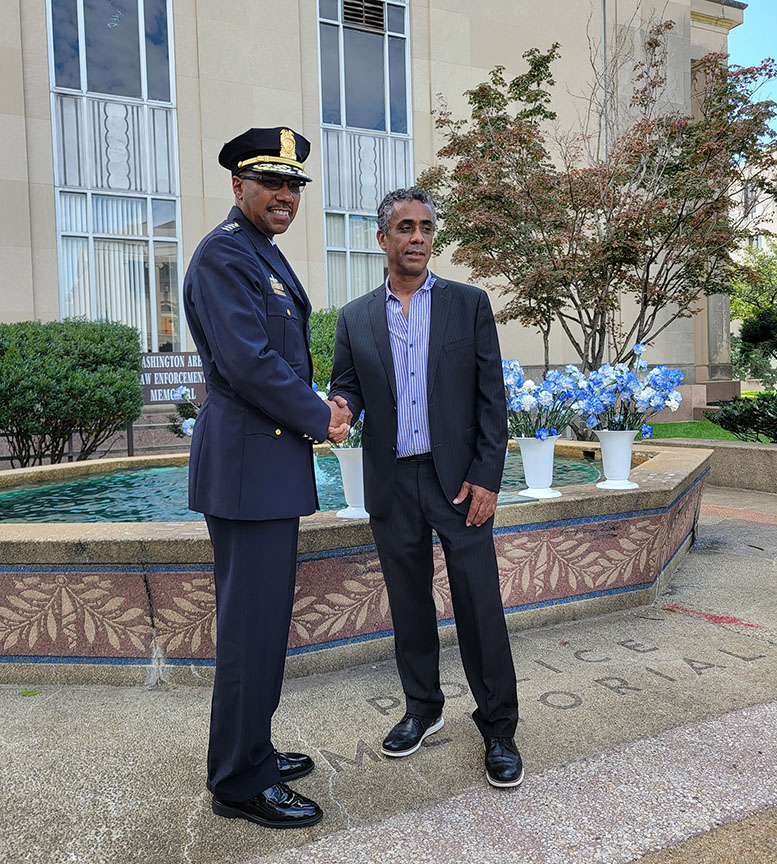On October 4, 2021, Robert Fleet joined the list of fallen officers of the Washington, DC Metropolitan Police Department and was honored at the 42nd Annual Washington Area Law Enforcement Officers Memorial Service. The service was held at the Washington Area Law Enforcement Memorial, in front of MPD headquarters at 300 Indiana Ave, NW.
As part of the DC Police Memorial and Museum’s mission involving the cherished history of the department, we are committed to ensure we provide true and accurate information.
During our continued research, we discovered an officer who died in 1874, but, at the time, his death was not considered in the line-of-duty. His name is Robert Fleet. This was a time before telephones, police call boxes, police radios and certainly before cell phones.
Officer Robert Fleet was 32 years of age and assigned to the 2nd Precinct. He was working the midnight tour and, like most officers in those days, he was assigned to foot patrol. He would have been wearing one of the old, VERY HEAVY, BACKBREAKING, wool overcoats. At approximately 1:17 AM, he observed a house located on the corner of 15th & Q Streets NW on fire. He immediately turned and ran full tilt the three blocks to Fire Box 79, pulling the alarm at 1:20 AM. He succeeded in turning in the alarm, however, as soon as he pulled the alarm, witnesses observed him fall to the ground. The witnesses ran to help him, but it was too late. Officer Robert Fleet was gone. He suffered what was later confirmed to be a heart attack.
We, at the DC Memorial and Museum, obtained additional evidence of the death of Officer Fleet and turned it over to the department. After confirming our discovery, Chief of Police Robert J. Contee, III, completed the lengthy investigation and ruled Officer Robert Fleet had died in the line of duty. He authorized Officer Fleet to be added to MPD’s list of fallen officers effective October 2, 2021.
Fleet is now listed as the second officer from the Metropolitan Police Department to die in the line of duty and the first African American officer to die in the line of duty. Previously, Officer John Purcell was considered the first African American police officer to be killed in the line of duty. Purcell was shot and killed October 17, 1923. We must note, however, that it is possible another African American officer was killed in the line of duty prior to Purcell. When an officer is killed, there is no mention of their race – as it should be. Without a photograph, we often have no way to tell the race of an officer. We treat every officer equally. They all wear the blue uniform with a silver or gold shield of the Metropolitan Police Department of Washington, D.C.
It is our believe that, in those days, unless you were shot, stabbed or beaten to death, it was not considered a line-of-duty death. No one had been identified as dying from a heart attack until 1962, when Detective Sergeant James Roche, assigned to the US Capitol Police detail, suffered a fatal heart attack as he attempted to arrest a crazed man at the U.S. Capitol. There are indications, based on newspaper articles, to suggest Detective Sergeant Paul W. Jones, who died in 1936, may have died from a heart attack. He was driving an unmarked police cruiser on the Baltimore Washington Parkway and suddenly veered off the road for no apparent reason, struck a tree, and died. His death was ruled as an auto accident. Today; several are on the rolls of our fallen as the result of a heart attack.
Simeon Deskins, Officer Fleet’s great-grandson, attended today’s ceremony. Don Blake, Founder and Chair of the DC Police Memorial and Museum spoke at the ceremony and awarded Chief Contee with a replica of Fleet’s badge with his original badge number 13. Please watch the video below for Don’s speech and photos of Deskins.
Thank you to Bill Ritchie for his role in the genealogical research that helped identify Officer Fleet’s role in history and for putting together this video of today’s ceremony.


Rendering of the new Memorial Wall to be built by the DC Police Memorial and Museum.


